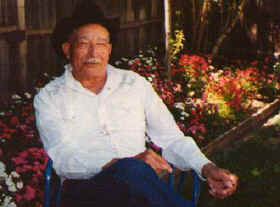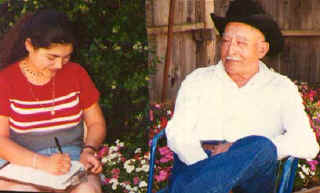|
| |
Conquering Prejudice

Interview and commentary by
Mabel Parra

As I open the door of the classroom my heart starts to beat rapidly. I am nervous and
preoccupied; I want my guest's presentation to be successful. After my classmates sit
down, I introduce Mr. Nick Baca. I have known Mr. Nick to be a generous and humble person.
Over his life-time, he has served both his family and his community. I admire him because,
even through the rough times in his life, he has maintained a generous, open heart.

Nick Baca was born in 1917 in the little town of La Cabra (the goat) in the state of
New Mexico. Mr. Nick describes his town as "a beautiful town where there weren’t
any cars or pollution to worry about." He grew up there with his four brothers and
three sisters in the little town. As young children with mixed ancestry (part Apache-part
Spanish), they had to suffer the prejudice of their classmates. Nick tells us how strict his parents were at that time: "When someone
came to our house, my mom would send us to get a glass of water. We had to stand still in
front of the person with our arms crossed until the person was done drinking the water. If
we dared to move my mom would hit us with a wooden stick after the person had gone." Nick tells us how strict his parents were at that time: "When someone
came to our house, my mom would send us to get a glass of water. We had to stand still in
front of the person with our arms crossed until the person was done drinking the water. If
we dared to move my mom would hit us with a wooden stick after the person had gone."
Mr. Nick went through many hard times, he remembers how the depression era affected
him and his family members. During that time his family lost most of their belongings and
valuables. These possessions were sold in order to purchase food. As a result Nick was
forced to drop out of school and to start working in the fields with his father. This was
necessary in order to help his father support the family. Nick describes the time when he
was working on a farm, where he earned a box of eggs, a quart of milk and twenty five
cents. He had a deal with his boss, in which his boss would not tell Nick's father that he
was earning twenty five cents. "Twenty five cents in those days was a lot of money, I
would go out and buy a big piece of hamburger for the whole family and still keep the
change for myself." However, his generosity was so immense that he would not keep the
money left over, instead he would share it with his family.
Some of the rough times that Mr. Nick experienced were very unpleasant. As he began to
speak to us, he slowed down and choked up. The expression on his face showed a pain that
hadn’t been erased. Nick described the discrimination that was going on at that time
in his little town. At school he and his friends would eat under the trees to hide from
the other students. The other kids ridiculed Nick and his friend because their lunches,
consisting of rice, beans, and tortillas, were different.

"I grew up in a state where there was discrimination, and as a kid I
couldn’t understand why all that was. I couldn’t eat with the majority people,
and the barbers refused to cut my hair."

As a kid it was hard to grow up in an environment of prejudice. Mr. Nick held up his
hands and described how one day he realized that "where ever there is majority of
people, they will always rule the minority." Nick said throughout his lifetime the
white people were "the majority."
One of his experiences in dealing with the majority occurred one day when Nick and his
friends were at a restaurant eating and having a good time. Nick wanted to hear music, so
he got up and walked towards the juke box. Suddenly a big crowd of white males stopped him
and would not let him play his music. The crowd threatened Nick and forced him and his
friend to leave the place. Nick and his friends couldn’t do anything since they were
three in numbers compared to ten.
Nick also encountered discrimination in his work place. He was working on a farm for a
wealthy white man. One day he requested a day off so that he could go see his sick
grandmother. Nick’s boss denied his request. Nick said he was going no matter what.
As Nick began to leave, his boss threatened to turn his name over to the Draft Board. A
short time later, Nick was drafted.
Nick said that, during WWII, many Americans were drafted in this way. Local Boards
were run by local businessmen during this time, and some used the threat of the draft
against their employees. Nick claimed that he was drafted because he defied his employer.
In those days, married who had children or men who worked in the fields were not drafted.
However for Mr. Nick, he was drafted to war even though he was working on a farm and was
married. Nick explained that it was hard to go to war and leave his family. It made him
sad to think that there was a possibility of never coming back and never seeing his family
again.
Nick served willingly, he was proud to serve. He spoke of witnessing many awful things
during his time over seas. One of the worse memories he described was when he and other
soldiers were liberating Jewish prisoners from concentration camps at the end of the war.
He said that he had never seen such horrible conditions.

"I witnessed the suffrage and the horrible health conditions that the people had
to endure. They didn’t have enough food and they were forced to live in rooms that
were full of adults and children who were sick and dying. It is sad to see what humans can
do to other humans."

Nick expresses the happiness he felt when they helped those people to get out of those
conditions. This is a good example of Nick’s caring personality.
 In 1957, Nick and his family decided to moved to
Mountain View, California to look for better opportunities. Three months later, Nick got a
construction job that paid much more that he had ever earned. He never went back to live
in Colorado. Nick spoke of the big changes that he witnessed in the San Francisco Bay
area. When he arrived, there were acres and acres of fruit orchards and farms. He raised
his hand to point in the direction of the El Camino Real, a local thoroughfare, saying
that many of the major highways are still located in the same places. In 1957, Nick and his family decided to moved to
Mountain View, California to look for better opportunities. Three months later, Nick got a
construction job that paid much more that he had ever earned. He never went back to live
in Colorado. Nick spoke of the big changes that he witnessed in the San Francisco Bay
area. When he arrived, there were acres and acres of fruit orchards and farms. He raised
his hand to point in the direction of the El Camino Real, a local thoroughfare, saying
that many of the major highways are still located in the same places.
After working for years, Mr. Nick retired. Then he devoted more of his time to
community service. He has always enjoyed helping people. Mr. Nick participated in a number
of activities to get food from the community to give to the poor. Having experience in
landscaping, he volunteered to build the Senior Center garden. There he helped grow free
vegetables for senior citizens in the community. Sometimes at Halloween, Nick would give
pumpkins to elementary school children who visited the garden. Every time the kids would
go to the garden, Mr. Nick would always welcome them with a big smile. This was one of the
happiest times in Mr.Nick’s life. For his intense and dedicated community service,
Mr. Nick has received several awards from the City of Mountain View and the Chamber of
Commerce. Even with recognition such as this, Nick remains his humble and caring self.

Smiling and about to continue on his journey through more recent experiences, Mr. Nick
is interrupted by my reluctant announcement that it is time for class to end. Nick
cheerfully thanks us for listening to his story. A strong wave of applause follows; it
lasts for a long time. After Mr. Nick's heartfelt presentation, many students left with
smiles. Some stopped to thank him for his inspirational story telling and to wish him
well.

Constructed with the assistance of Learning Community
student Alana Salom
|